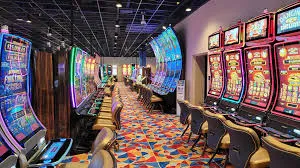With the rise of gambling and its popularity, casinos have become a significant part of the American landscape. From Las Vegas to Atlantic City, these establishments have captured the imagination of people from all walks of life. According to recent statistics from Play Today, there are currently over 1,000 commercial and tribal casinos operating in the United States alone, generating billions of dollars in revenue each year.
In this article, we will take a closer look at the states that have embraced the casino industry and the impact it has had on their economies. We will delve into the reasons why certain states have legalized gambling, the benefits and drawbacks of having casinos, and how they have fared in comparison to others. So buckle up and get ready for an in-depth exploration of the state of casinos in America.
The History of Casinos in the U.S.

Before we dive into the list of states with casinos, let’s take a brief trip down memory lane to understand how the casino industry came to be in the United States. Gambling has been a part of American culture since the early days of the colonies, with lotteries and card games being popular forms of entertainment. However, it wasn’t until the late 19th century that casinos as we know them today started to emerge.
The roots of modern-day casinos can be traced back to the old saloons of the Wild West, where cowboys and outlaws would gather to play poker, blackjack, and other games of chance. These establishments quickly gained notoriety for attracting shady characters and causing social problems, leading to many states banning gambling altogether.
It wasn’t until 1931 when Nevada legalized gambling that casinos started to make a comeback in the U.S. The state’s decision to legalize gambling was driven by the Great Depression, which left Nevada’s economy in shambles. The legalization of casinos was seen as a way to bring much-needed revenue to the state, and it quickly became a popular destination for gamblers.
Fast forward to the 1970s, and gambling laws in the U.S. started to relax further, with states like New Jersey, Mississippi, and Illinois legalizing casinos as a way to boost their struggling economies. Today, there are 40 out of 50 states with some form of legalized gambling, and the industry is showing no signs of slowing down.
The Top States with Casinos

Now that we have a better understanding of the history of casinos in the U.S., let’s take a look at the top states that have embraced the casino industry. These rankings are based on data from Play Today, which takes into account the number of casinos, annual gaming revenue, and overall economic impact.
1. Nevada
It should come as no surprise that Nevada tops the list, considering it’s the birthplace of modern-day casinos. Also known as the “Silver State,” Nevada has been synonymous with gambling since the legalization of casinos in 1931. The state currently boasts over 330 casinos, including the famous Las Vegas Strip, which generates billions of dollars in gaming revenue each year.
Nevada’s casino industry has had a massive impact on its economy, generating over $12 billion in gaming revenue in 2019 alone. This money has helped create thousands of jobs and contributed significantly to the state’s tax revenue. However, like any other state with a heavy reliance on the casino industry, Nevada’s economy took a hit during the COVID-19 pandemic when casinos were forced to shut down.
Key Facts:
- Nevada has the most casinos out of any state in the U.S.
- Las Vegas brings in over 80% of the state’s total gaming revenue.
- Gambling accounts for nearly half of Nevada’s overall tax revenue.
2. Pennsylvania
Pennsylvania is another state that has seen a massive growth in its casino industry in recent years. The state legalized casinos in 2004, and since then, it has experienced a significant boom in both commercial and tribal casinos. In 2019, Pennsylvania generated over $3 billion in gaming revenue, making it the second-highest in the country.
The state’s decision to legalize casinos was driven by a need to boost its struggling economy and create jobs. And it has certainly paid off. The casino industry has created thousands of jobs in Pennsylvania, and the tax revenue generated from gambling has helped fund various state programs like education and healthcare.
Key Facts:
- Pennsylvania has 12 commercial casinos and six tribal casinos.
- The state’s first casino, Mohegan Sun Pocono, opened in 2006.
- Pennsylvania’s online gambling market is also one of the largest in the U.S.
3. New Jersey
New Jersey is often referred to as the “Las Vegas of the East Coast,” and for a good reason. The state has a long history with gambling, with the first casino, Resorts Casino Hotel, opening in Atlantic City in 1978. Today, there are nine casinos in Atlantic City, generating billions of dollars in revenue each year.
New Jersey’s gambling industry has had a considerable impact on the state’s economy, providing employment and contributing to tax revenue. However, like Nevada, Atlantic City’s casinos were hit hard by the pandemic, forcing them to shut down temporarily. But with the rise of online gambling in New Jersey, the industry is slowly starting to recover.
Key Facts:
- Atlantic City casinos generate over $2 billion in annual gaming revenue.
- New Jersey was the second state to legalize online gambling in the U.S.
- The state has plans to expand its casino industry by building two additional casinos in Northern New Jersey.
4. Louisiana
Louisiana may not be the first state that comes to mind when you think of casinos, but it has a thriving gambling industry. The state legalized casinos in 1991, and today there are over 30 commercial and tribal casinos scattered across Louisiana. In 2019, the state’s gaming revenue exceeded $2 billion for the first time, making it a major player in the casino industry.
The majority of Louisiana’s casinos can be found in New Orleans, which is known for its vibrant nightlife and lively casino scene. But the impact of gambling goes beyond just tourism. The casino industry supports thousands of jobs in Louisiana and generates significant tax revenue for the state.
Key Facts:
- The first riverboat casino in Louisiana opened in 1993.
- Louisiana’s casinos are required to pay a 21.5% tax on their gross gaming revenue.
- There are plans to expand gambling in the state by allowing sports betting at casinos and racetracks.
5. Mississippi
Another state that has seen a significant growth in its casino industry is Mississippi. The state legalized casinos in 1990, and since then, it has become a major destination for gamblers from all over the country. Currently, there are over 30 casinos in Mississippi, generating billions of dollars in gaming revenue each year.
Mississippi’s casino industry has played a crucial role in boosting the state’s economy and providing employment opportunities. Many of the casinos are located along the Gulf Coast, providing a much-needed source of income for communities that were devastated by Hurricane Katrina.
Key Facts:
- Mississippi was the third state to legalize casinos in the U.S.
- The state’s gaming revenue reached an all-time high of $2.2 billion in 2019.
- In addition to casinos, Mississippi also allows sports betting at licensed casinos.
6. Indiana
Rounding out the top six states with casinos is Indiana. The state legalized casinos in 1993, and since then, the industry has flourished. Today, there are over a dozen casinos in Indiana, generating billions of dollars in gaming revenue each year.
The state’s decision to legalize casinos was driven by a need to boost its economy and create jobs. And it has certainly delivered on both fronts. The casino industry has provided thousands of jobs for Indiana residents and brought in significant tax revenue for the state.
Key Facts:
- The first riverboat casino in Indiana opened in 1995.
- Indiana is one of the few states that also allow land-based casinos.
- In 2019, Indiana’s gaming revenue reached over $3 billion for the first time.
The Impact of Casinos on State Economies

Now that we have looked at the top states with casinos, let’s delve deeper into the impact these establishments have had on their economies. The legalization of casinos has been a contentious issue, with supporters touting the benefits, while opponents argue about the negative effects. So let’s take a closer look at both sides of the coin.
The Benefits of Casinos
One of the most significant benefits of having casinos is the boost they provide to the local economy. As we have seen with the states listed above, casinos generate billions of dollars in revenue each year, which translates to employment opportunities and increased tax revenue for the state. A study done by Oxford Economics found that the U.S. casino industry supports over 1.8 million jobs and generates over $40 billion in tax revenue annually.
Another benefit of having casinos is the potential for economic growth in underdeveloped areas. Many casinos are built in areas that have historically been struggling economically, bringing in much-needed investment and revitalizing the community. This is especially true for tribal casinos, as they often provide employment and services to Native American communities that have been marginalized in the past.
The Drawbacks of Casinos
While the benefits of casinos are undeniable, there are also drawbacks to consider. One of the most common arguments against casinos is the potential for an increase in problem gambling. Studies have shown that the closer a person lives to a casino, the more likely they are to develop a gambling addiction. This can lead to financial ruin and contribute to social issues like crime and domestic problems.
Another concern is the negative impact casinos can have on small businesses in the area. With the rise of online gambling, many local establishments, like bars and restaurants, have seen a decline in customers as people choose to gamble from the comfort of their own homes. This can have a ripple effect on the local economy, leading to job losses and decreased tax revenue.
The Future of Casinos in the U.S.

The casino industry in the U.S. is constantly evolving, with new technologies and trends shaping its future. So what can we expect in the coming years? Here are some key developments to keep an eye on:
The Rise of Online Gambling
With the pandemic forcing casinos to shut down temporarily, the popularity of online gambling has skyrocketed. Many states have already legalized online gambling, and more are expected to follow suit in the near future. This could have a significant impact on the traditional brick-and-mortar casinos, especially in smaller states where online gambling may provide more convenience for players.
The Legalization of Sports Betting
Sports betting is another trend that is gaining traction in the U.S. Before 2018, only four states were allowed to offer sports betting, but with the repeal of the Professional and Amateur Sports Protection Act (PASPA), more and more states are starting to legalize it. This presents a new avenue for the casino industry to expand and attract a different demographic of customers.
The Emergence of Integrated Resorts
One trend that has been successful in other parts of the world, like Macau and Singapore, is the concept of integrated resorts. These are large-scale developments that combine a casino with other forms of entertainment, such as hotels, restaurants, and retail spaces. The idea is to create a destination where people can stay, play, and dine all in one place.
Conclusion
The impact of casinos in the United States cannot be understated. For many states, they have become a vital source of revenue and employment opportunities. However, as we have seen, there are also concerns about the negative effects of gambling. As the industry continues to evolve, it will be crucial for states to strike a balance between economic growth and responsible gambling practices.
In this article, we have explored the top states with casinos and how they have fared in terms of revenue and economic impact. We have also delved into the history of casinos in the U.S. and the reasons why certain states have legalized gambling. While opinions may vary on the pros and cons of having casinos, one thing is for sure – they are here to stay, and their impact on the American landscape will continue to be significant.



